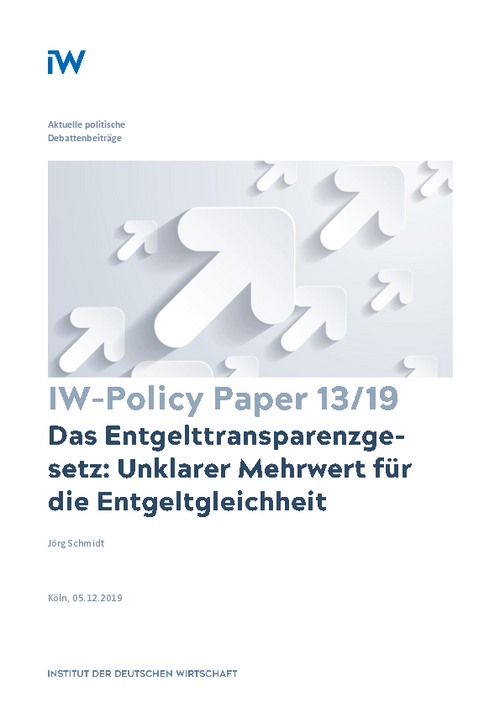The introduction of the Transparency in Wage Structures Act (EntgTranspG) in 2017 in Germany aimed to enforce the principle of equal pay for women and men. The main focus was on the statistically unexplained part of the gender pay gap and the resulting view that the practical application of the equal pay principle had not been realised. The first evaluation of the law was presented in July 2019.

The transparency of charges: Unclear added value for equal charges
IW-Policy Paper

The introduction of the Transparency in Wage Structures Act (EntgTranspG) in 2017 in Germany aimed to enforce the principle of equal pay for women and men. The main focus was on the statistically unexplained part of the gender pay gap and the resulting view that the practical application of the equal pay principle had not been realised. The first evaluation of the law was presented in July 2019.
In this context, the present contribution critically examines the initial finding of indirect pay discrimination. Firstly, the pay gap (unadjusted and adjusted) cannot be interpreted as quantitative evidence of a pay discrimination. In addition, an analysis of the causes of the pay gap and considering the incentive structures of enterprises leave practically no room for structural pay discrimination. Secondly, the causal effects of wage transparency on the pay gap of women and men have not yet been sufficiently researched. It is therefore largely open to what extent the pay gap can be reduced by transparency regulations. Potentially negative consequences for companies that may arise as a result of the increased transparency of salaries within the companies have hardly been or are hardly discussed.
Finally, the evaluation report makes clear that a relatively high proportion of employees already exchange information on wage and salary issues and that there is currently little interest a request for information. Despite the limited data available, such a request is claimed by women and men equally and is predominantly aimed at obtaining information about one’s own value for the company. In the future, a significantly higher proportion of employees can imagine making use of the right to information, but there appears to be a similar motivation. It is therefore questionable whether and to what extent the right to information can at all provide an impulse to reduce the (adjusted) pay gap. Moreover, the evaluation report shows that the vast majority of companies subject to management reporting requirements have already implemented or are planning to implement the existing reporting obligation on the issues of gender equality and equal pay.
Overall, the EntgTranspG and in particular the individual right to information in companies with more than 200 employees is currently proving to be a bureaucratic act with no discernible added value. Due to the short period of time since the introduction of the law, it is still unclear whether or to what extent a quantitative reduction of the (adjusted) gender pay gap in the target group has been caused by the law. Therefore, in essence, no further adjustments should be made to the EntgTranspG. In addition, a fundamental revision of whether the law and the individual entitlement to disclosure may be appropriate would be desireable in the future– especially to check whether the instruments can contribute to the objectives of the law. When assessing the effectiveness of the Act, it would also be useful not only to investigate the extent to which a causal reduction in the (adjusted) pay gap can be proved, but also to consider the (negative) consequences for the companies that may have occurred.

Jörg Schmidt: Das Entgelttransparenzgesetz – Unklarer Mehrwert für die Entgeltgleichheit
IW-Policy Paper

More on the topic

German Wage Policy between Inflation and Stagnation: Are Conflicts with the Aims of Monetary Policy Looming?
After the economic and financial crisis of 2008/9, the German labour market soon began to recover, creating scope for a comparatively expansive wage policy.
IW
The Pros and Cons of Trade Union Membership
The decline in collective bargaining coverage in Germany is often attributed to the reluctance of companies to join an employers' association which negotiates collective agreements.
IW